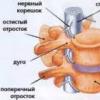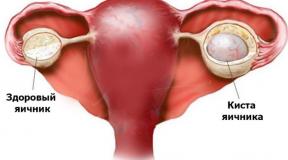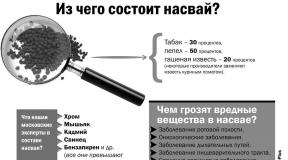What to do if the tax deduction has not been transferred. Advice from financiers: if the tax deduction is not transferred on time - what to do? The tax office does not return the deduction: reasons
The possibility of applying a tax deduction emphasizes the social nature of the state, which meets halfway its citizens who pay income tax (NDFL). Individuals who pay 13% personal income tax have the right to deduct from the tax base the amount or part of the amount of expenses incurred related to having children, buying or selling housing, paying for medical services, and others.
It should be clarified that not the entire amount of expenses from the tax paid is deductible, but that part of the tax that corresponds to the expense. Tax deductions cannot be used by certain categories of individuals who do not pay personal income tax. This:
- Individual entrepreneurs using a simplified taxation system and paying a single tax on imputed income.
- Unemployed persons receiving unemployment benefits and having no other sources of income.
Standard tax deductions include deductions that apply to children, as well as to certain categories of taxpayers. If a person has the right to apply deductions in several areas, the one whose value is the largest is applied.
These deductions can be issued either from the employer or at the end of the reporting period when submitting a tax return in Form 3-NDFL and related documents to the tax office.
Deductions for children
The amount of tax deductions for children is determined by the tax code and is 1,400 rubles for the first child and the same amount for the second, 3,000 for the third and for any subsequent child. The order of children is determined by date of birth - from oldest to youngest. If the child is disabled, then the tax deduction amount is 3,000 rubles. The total amount is deducted from the tax base on a monthly basis until the total income from the beginning of the year, summed up on an accrual basis, does not exceed 280 thousand rubles. After this, the person is deprived of the right to make deductions in the current year. From the first month of the next year, the right to apply the deduction is restored to the corresponding excess of income in the amount calculated from the beginning of the year, equal to 280 thousand rubles.
This tax deduction can be applied by each of the parents or, subject to a written refusal of one of the parents from the tax deduction, the second parent can use a double tax deduction.
The double tax deduction can be applied by the only parent until he enters into another marriage.
This deduction is made for all children raised in families, including foster children, adopted children, who remain in care until the children reach the age of 18 and until the child reaches the age of 24, if the child is a full-time student, in graduate school, is an intern or a cadet.
Deductions that can be made by certain categories of taxpayers
 Certain categories of taxpayers may receive the following deductions:
Certain categories of taxpayers may receive the following deductions:
- Deductions in the amount of 3,000 rubles can be applied to a wide range of people who took part in the elimination of accidents with a radiation component, in the assembly, testing and disposal of radioactive weapons and equipment, and disabled military personnel.
- Deductions in the amount of 500 rubles can be applied to heroes of the USSR and the Russian Federation, participants in wars, blockades, disabled people since childhood, persons injured as a result of radiation accidents and resettled from contaminated territories, persons who acted as bone marrow donors, persons who took part in Afghan hostilities, parents and spouses of deceased servicemen.
These deductions from the tax base can be applied monthly without any restrictions on time and amount of income.
Social tax deductions
Social tax deductions include deductions for expenses on:
- Charity.
- Education.
- Treatment and purchase of medicines.
- Spending of funds allocated to non-state pension funds.
- The funded part of the pension.
A social tax deduction can be made within 3 years from the year of personal income tax payment in which the taxpayer’s social expenditure took place. After 3 years, the taxpayer loses this right.
 , corresponding to the expenses incurred, can be received by an individual who has allocated funds for his own education, for the education of children and wards studying full-time, for the education of siblings.
, corresponding to the expenses incurred, can be received by an individual who has allocated funds for his own education, for the education of children and wards studying full-time, for the education of siblings.
In this case, the maximum amount of expenses that can be deducted from the tax base is:
- 50 thousand rubles for teaching children;
- 120 thousand rubles for own education and education of brothers and sisters in combination with other social expenses (treatment, sending money for pension insurance).
An educational institution (kindergarten, school, university, advanced training courses, training centers of all directions, driving school, music school and other art schools, youth sports schools) can be either public or private, but must have a license to operate.
Tax deduction for medical services and purchase of medicines
A tax deduction for medical services that are not considered expensive and the purchase of medicines is provided for expenses up to 120 thousand rubles in combination with other social expenses (training, pension insurance).
The limit on the amount of expenses does not apply to types of treatment that are considered expensive. In this case, a deduction can be provided to the extent of the entire income tax paid by the individual during the year in which the expensive treatment was carried out. Information about the type of treatment provided is indicated in the “Certificate of payment for medical services...”.
To receive a deduction for expensive treatment, you must provide additional certificates from a medical institution confirming that:
- This type of treatment was necessary.
- The institution did not have medicines or consumables to provide it free of charge.
- The purchase of medications was provided for in the contract at the expense of the patient.
Medical materials and services provided must be included in the List of Medical Services for which a deduction is provided.
Property tax deduction and tax refund from the purchase of an apartment
 The property tax deduction applies to expenses incurred by the taxpayer when selling property, purchasing or constructing housing, or purchasing a plot of land.
The property tax deduction applies to expenses incurred by the taxpayer when selling property, purchasing or constructing housing, or purchasing a plot of land.
Income tax on the sale of property in the amount of 13% arises in cases where ownership of the property lasted less than three years. Instead of receiving a deduction, an individual has the opportunity to deduct 1 million rubles from the amount received in the form of income from the sale of an apartment, house, land or 250 thousand rubles from the amount received in the form of income from the sale of a car, non-residential premises and other things. Tax is paid from the remaining amount after deduction.
The maximum amount of property tax deduction for the purchase or construction of housing is 2 million rubles.
If the full deduction is not taken within one year, the individual has the right to continue the deduction until it is taken in full.
However, the deduction for the purchase of housing does not apply if:
- The purchase was made with funds from maternity capital, the employer, other persons, and budget funds.
- The sale and purchase transaction was concluded between parents and children, between spouses, brothers and sisters, and other interdependent categories.
The procedure for returning a tax deduction and the necessary documents
To return overpaid income tax, the algorithm of actions for all types of tax deductions will be approximately the same.
Return procedure through the tax office
The procedure for returning a tax deduction for expenses incurred in the past year can be started during the following year at any time. As a rule, the beginning of the calendar year is chosen for this.
You should submit a tax return in form 3-NDFL to the inspectorate at your place of residence. The following documents must be attached to the declaration:
- Certificate from place of employment in form 2-NDFL about income received and payment of income tax.
- Copies of documents confirming the right to receive standard tax deductions (identification cards, birth certificates, certificates).
- Copies of documents confirming expenses incurred (service agreement, purchase and sale agreement, certificate of state registration of ownership, etc.).
- Copies of payment documents confirming expenses incurred (receipts, bank statements).
- Additional documents in some cases (for example, when paying for expensive treatment, when purchasing property in joint ownership, etc.)
When visiting a tax inspector and submitting documents for a tax deduction, you must present the originals of all submitted copies of documents to verify them.
Procedure for returning to the place of work
 Standard tax deductions can be issued directly from the employer during the year, without waiting for the end of the year.
Standard tax deductions can be issued directly from the employer during the year, without waiting for the end of the year.
To do this, you must submit an application to your employer for a standard tax deduction. Copies of supporting documents are attached to the application, including:
- Birth certificate.
- Marriage certificate.
- Certificate of child's full-time education.
- Certificate of disability.
- A copy of documents on guardianship or trusteeship, or that the parent is the only one.
Tax refund deadlines
The tax inspector is given 3 months to check the documents submitted for the deduction, after which he makes a positive, negative or corrective decision if the taxpayer’s calculation was made incorrectly.
A tax deduction is an opportunity to receive money from the state, or not pay taxes partially or even completely. The size of the tax deduction depends on two factors: your income and expenses incurred in certain categories. The most famous is the property tax deduction, under which you can return up to 260 thousand rubles, and in some cases even more. However, there are categories of other tax benefits for citizens that few people know about and, accordingly, do not receive money from them.
What is a tax deduction
First, let's explain in simple terms what a tax deduction is and why the state should return the money to you. Many people do not understand this or do not clearly understand the return procedure itself.
We all work and pay taxes. The state, “concerned” about caring for the population, automatically withholds income tax in the amount of 13% from our salaries. Or rather, the employer himself does this and transfers the money to the budget. As a result, you receive a “net” amount in your hands, after paying taxes. In addition, tax is withheld on any other income of individuals, but here the recipient of the income himself is obliged to pay taxes. But we won’t delve into this, but consider the simple case of receiving a single income in the form of wages.
The total aggregate income forms the tax base on which 13% tax must be paid.
Example. Monthly salary 50 thousand per month or 600,000 per year. This is the tax base. A 13% tax is withheld monthly. As a result, out of the initial 50,000, every month you receive 43,500 in your hands, and 6,500 rubles go to the budget in the form of income tax. For the year we receive 522,000 in net income and 78,000 in taxes paid.
In some cases, not all income is taxable. The tax base can be reduced and then 13% will be taken from a lower amount and you will pay less taxes. Tax deductions help with this.
A tax deduction is the amount by which the tax base is reduced.
If you have incurred expenses in certain categories established by law, for example, payment for a child's education, then you have the right to reduce your total annual income by this amount. And it is on this amount that you must pay 13% tax. But since you are deducted “in full” every month, you end up with overpaid tax at the end of the year. It is this that you can return back.
It is important to understand that tax refunds are the right of a citizen, but not the obligation of the state. Just like that, you won't get anything back. To do this, you need to take a number of actions, but more on that below.
Example. Income for the year is 600,000 rubles. Income tax will be 78 thousand. During the year, tuition fees were paid - 100 thousand rubles. This expense item falls under the category of tax deductions. Therefore, the total tax base can be reduced by this amount and will be 600,000 - 100,000 = 500,000 rubles.
It is from the amount received that the income tax should be taken, which in this case will be equal to 65,000 rubles.
The difference of 13 thousand (78,000 - 65,000) is subject to return from the state as overpaid to the budget.
Types of tax deductions
The state is not very generous when it comes to payments and, accordingly, the return of money back from the treasury. Therefore, the number of tax deductions can be counted on one hand. They can be roughly divided into 4 categories:
- Standard.
- Social.
- Property.
- Investment.
Everyone has the same meaning - a refund of the overpaid amount at a rate of 13%. The differences lie in the maximum amounts that can be received and some nuances for each type of deduction.
Standard
Apply to certain categories of citizens if one of certain conditions is met. For example, those with minor children, disabled children, for war veterans, Chernobyl victims, military personnel, and disabled people. The size of the deduction varies depending on the category.
For example, for parents with minor children, the non-taxable amount is 1,400 rubles monthly for each child. Moreover, both parents are entitled to this benefit. 13% from 1,400 rubles is 182 rubles. This means that every month you can receive a salary increased by exactly this amount.
Example. With a salary of 30 thousand, after withholding income tax, 26,100 comes out. But since the employee has two children, he has the right to receive a standard deduction. 2,800 rubles of his salary are not subject to 13% tax. It costs 364 rubles per month. As a result, the monthly real salary will be higher - 26,464 rubles.
On the one hand, the money is not that great, but if both parents use the right, then a decent amount can accumulate in a year - 8,736 rubles for two children.
Peculiarity. The tax benefit is taken into account monthly until the annual income level reaches 350 thousand rubles. After exceeding this amount, no money is paid.
Social
Social deductions include expenses incurred by citizens for treatment or education. The maximum tax deduction amount is 120,000 rubles per year. That is, you can return no more than 15,600 rubles.
Education
A person has the right to receive a deduction if he paid for education for himself, for his children, brothers or sisters.
Peculiarity. For each child, you can return no more than 5,600 rubles (50 thousand tax-free base).
Treatment
This benefit includes expenses incurred for treatment of yourself, your spouse, your children (under 18 years of age) and parents.
Peculiarity. In the category of expensive treatment, the amount of tax deduction is not limited.
IMPORTANT. Expenses for training and treatment are combined by the state into one category - social deductions with the maximum possible tax-free amount of 120,000 rubles. If you spent much more in a year, you will be able to return no more than 13% of this amount or 15,600 rubles.
Example. Ivan Ivanovich Ivanov spent 100,000 rubles on treatment in a year and paid for his son’s education - 50,000 rubles. Total 150,000. 13% of this amount is 19,500. But he can only return 15,600 rubles. The remaining amount of 30,000 rubles is not taken into account and is not carried over to the next year (it burns out). That is, next year Ivanov can no longer claim a refund of the remaining amount.
Property
Perhaps the most popular method of returning money among our citizens. Valid for the purchase of real estate and land. You have the right to return 13% of all expenses incurred by you, including payment of interest on the loan.
A significant difference between this deduction and the previous ones is the ability to carry over the remaining amount of tax refund debt from the state to the next year. And so on until you have fully returned the entire amount due to you.
Peculiarity. The maximum tax deduction amount should not exceed 2 million rubles. You can return no more than 260 thousand in your hands. Additionally, the deduction for interest (if the apartment has a mortgage) is 3 million rubles or 390 thousand in hand. In total, up to 650 thousand can be returned within several years.
If within one year you have the right to a refund for social and property deductions, first of all use social benefits, and only then a refund for housing.
Example. An apartment was purchased for 900,000 rubles. In the same year, there were treatment expenses in the amount of 100 thousand rubles. Total - you have the right to return 13% of 1 million or 130 thousand. Taxes for the current year were withheld - 50 thousand.
Next year you need to take advantage of the right to return money for treatment - 13 thousand and return part of the money for the apartment - 37 thousand. The remaining amount of the property deduction is carried over to the next year and so on until it is paid in full.
IIS
A relatively new type of tax benefit. It appeared at the beginning of 2015 to increase financial literacy and attract people to the Russian stock market.
According to the law, the period for checking a tax return should not exceed 3 months from the date of filing the return. Another month is given for the money to be transferred to your account. As a result, the maximum period from filing a return to tax refund is no more than 4 months. In fact, they list it earlier.
Required documents:
- passport or other identification document;
- certificate of taxes paid in form 2-NDFL;
- declaration 3-NDFL;
- application for refund;
- documents confirming expenses incurred.
Finally
At first glance, the refund procedure looks overly complicated and time-consuming. You need to collect some papers, fill out a declaration, write applications, submit everything to the tax office. And if for property deductions you immediately get a good return in the form of several tens or even hundreds of thousands of rubles, which can be returned to you, then for many people the social benefits are not so obvious.
Some people think like this: “Why should I bother returning some amount of 2-3 thousand. Yes, even 5-6 won’t do the trick for me. I’ll spend more time and energy on the design.”
You can look at this a little differently. Answer 3 simple questions:
- How much do you earn per day at work? What about an hour? Including travel there and back + lunch.
- How much can you return from the budget?
- How much time (hours) will you spend filing your return (approximately)?
Now simply divide the refunded amount by the number of hours spent. You will receive the cost of 1 hour of your time to return taxes. Compare it with your salary received per 1 hour.
For example. You earn 200 rubles per hour, and upon tax refund, the price of the time spent will be 400 rubles per hour.
When contacting government agencies, taxpayers often encounter problems: what to do if the Tax Service does not transfer the tax deduction on time? This situation is common, and often due to the fault of the applicants themselves.
But it also happens that tax officials violate the rights of citizens. Where to complain and what actions to take to speed up the process of returning funds from the budget?
The tax office does not return the personal income tax deduction - where to complain? Before asking such a question, you need to know exactly when the answer is required by law. How long does it take for the Tax Office to transfer the deduction?
- the declaration is verified 3 months from the date of acceptance by the Federal Tax Service, a similar period for reviewing 3-NDFL for a tax refund submitted through the Personal Account, it can also be tracked here;
- then you need to wait another 1 month from the date of filing the application for a refund or from the date of completion of the desk audit in accordance with clause 6 of Article 78 of the Tax Code of the Russian Federation;
- It takes the bank several days to process the payment and credit the money to the client’s account.
Now let’s calculate how quickly the Federal Tax Service returns personal income tax. It turns out that the maximum period is 4 months + another 1-2 working days. This position is confirmed by the Letter of the Ministry of Finance dated July 11, 2014 No. 03-04-05/34120 and the Letter of the Federal Tax Service of Russia dated October 26, 2012 No. ED-4-3/18162@.
Let's look at an example: within what period should the Tax Office return the deduction for an apartment? The documents along with the application were submitted on 03/22/2019, the verification will be completed on 06/23/2019, the funds will be sent by 07/24/2019. Accordingly, you should expect receipt of overpaid tax within a couple of business days.
Reasons why the Federal Tax Service did not return the overpaid tax
Having found out when the Tax Service transfers the deduction after checking the declaration, you need to understand what may be causing delays in the return. There are not many reasons:
- You forgot to submit along with 3-NDFL. If this is the case, you can send the document at any time. Within 30 days, the paper will be reviewed and funds will be sent to a bank account;
- You did not indicate payment details or made mistakes - the money cannot arrive;
- You have arrears on penalties and other taxes - the Federal Tax Service did not transfer compensation, since it was used to offset an existing debt;
- Based on the results of reviewing the declaration, a decision was made to refuse - for example, there are inconsistencies in the information, there are no documents confirming expenses, etc. The decision must be sent to the taxpayer;
- The application was lost - such situations are rare, but can also be the reason why the Tax Service does not transfer the deduction if 4 months have passed;
- The blame lies entirely with the Federal Tax Service - the delay is due to workload, incompetence of employees or other reasons that should not worry the taxpayer.
If the Federal Tax Service does not return personal income tax for more than a month from the moment the decision on the deduction was made, then you need to find out the reasons for the delays, and then understand what needs to be done.
Where to complain about violation of deadlines for receiving a deduction?


When the Tax Service does not transfer property deductions on time without objective reasons, what to do in this situation? There are several ways to influence the return process:
- Call or personally go to the Federal Tax Service, if the tax deduction did not arrive on time, find out what is causing the delays;
- Submit an application to the head of the Inspectorate, telling about the current situation - indicate the date the documents were sent, the presence of debts, the date when the desk audit was completed, write “I can’t get a tax deduction” in free form. If the Tax Service does not return personal income tax on time, demand payment of a penalty;
- Another way is to file a complaint against the actions of employees. Where and to whom should I complain if the Tax Service delays payment? The request should be sent to the supervisory inspection; a response will come within 30 days.
All correspondence can also be conducted through the taxpayer’s Personal Account. If the tax office does not transfer the deduction, although the deadline has passed, you need to select the “Life situations” tab at the top in your personal account and then (at the very bottom) - “Other situations”.

After that, click on the section “Complaints against acts, actions (inaction) of officials.”

After this, in a new window that opens, you can write a statement about the unlawful actions of your tax authorities.
If the Federal Tax Service does not pay the money, for each day of delay interest will be charged at the refinancing rate of the Central Bank of the Russian Federation within the framework of clause 10 of Article 78 of the Tax Code of the Russian Federation.
How to file a complaint against the Federal Tax Service for missing a payment deadline?
When a tax deduction is not returned on time, a complaint about inaction is filed electronically. Submit it simply:
- Go to the tax website nalog.ru, select “All services”;
- Click on the inscription “Contact the Federal Tax Service of Russia”;
- Please indicate that you are an individual;
- Select the desired Department or Federal Tax Service;
- Indicate your full name, telephone number, INN, if you know;
- Write about the problem that you have not been paid a deduction within 4 months.
Within a month, the situation will be studied and the taxpayer will receive an answer. Accordingly, if the decision is in his favor, the money will be transferred to a bank account.
In a situation where the refund amount was underestimated, the court becomes the last resort - the claim must be filed within 3 months after the refusal of the tax authorities under clause 1 of Article 219 of the CAS of the Russian Federation.
How to calculate the amount of compensation for delay?

 The inspectorate is obliged to return not only personal income tax, but also interest for the use of other people's funds. What can you expect? Let's try to figure it out with an example:
The inspectorate is obliged to return not only personal income tax, but also interest for the use of other people's funds. What can you expect? Let's try to figure it out with an example: - You submitted a declaration and application for a refund of 200 thousand rubles with the correct information;
- The deadline was missed by 37 days;
- Refinancing rate – 7.75%;
- The compensation will be: 200,000 * 37 * 7.75% / 360 = 1,593 rubles.
Note! Next year you will be required to pay personal income tax on this compensation by submitting a declaration. Thus, 13% of this amount will be returned to the budget.
Now you know how to complain to the Tax Office for non-payment of personal income tax. If the Inspectorate does not pay, you need to find out the reason, and then understand how to act.
Situations when the Federal Tax Service does not return overpayments of taxes to an individual occur in practice. However, for delays, you are required to increase the amount to be returned: after all, all this time the budget organization has been managing your money.
What situations were there in your practice? Were there delays in payment and whose fault was it? Share your story in the comments!
If you need personal advice or assistance in filling out the 3-NDFL tax return, as well as sending it to the tax office through the “Taxpayer Personal Account” service, feel free to go to our page.

A property deduction is a constant amount specified by law that partially compensates for the amount of taxes already paid on the income of citizens in connection with their acquisition of residential real estate. This benefit applies both to the purchase of a property using your own or privately borrowed funds, and after taking out a targeted mortgage loan for the purpose of purchasing housing.
In the first case, the maximum amount claimed for compensation is 13% of RUB 2.0 million. upon documentary confirmation of all expenses incurred within this amount. In the second case, an individual is provided with a refund of mortgage interest, which cannot exceed RUB 3.0 million. for the entire lending period, no more than the amount of interest paid on the loan for the current reporting tax period and no more than the amount of income taxes actually paid for this period, according to form 2-NDFL.
Documents required to obtain a tax deduction
To receive a property deduction due by law, the taxpayer is required to provide the following set of documents:
- A valid passport of a citizen of the Russian Federation.
- A document confirming the right to own a residential property. It can be either a certificate of ownership or an extract from the unified state register about the ownership of an apartment, house, land plot or other property.
- An agreement drawn up between the seller and the buyer in the form of a purchase and sale agreement, confirming the official transfer of ownership from one person to another, indicating the transaction amount, as well as the attached deed of transfer of ownership of the specified housing. The seller can be an individual, an individual entrepreneur or a company.
Important! The contract must be accompanied by all available documents, receipts and payment orders certifying the actual transfer of funds to the seller as payment for the transferred object.
- When the buyer contacts the bank for a mortgage loan, the tax authority must also provide a loan agreement signed by both parties with an appendix sheet on the appointment of annuity payments indicating the accrual of interest for each required payment. The agreement with the bank also includes payment stubs actually made for the current reporting period.
- A certificate in form 2-NDFL confirming that the citizen has received income and paid income tax in the amount of 13% of the total amount of assessments.

All of these documents are supplemented by the 3-NDFL declaration, collected in a common package and submitted at a time to a special window in the Federal Tax Service Inspectorate office against a receipt with a list of all papers submitted for consideration. After carrying out this procedure, the documents are considered accepted and a desk audit is scheduled, carried out within the established time frame.
An important amendment is that when acquiring a residential property by direct purchase after January 1, 2016, the minimum period of its ownership must be at least 5 years from the date of receipt of the certificate of ownership, and before this period a citizen has no right to receive a property deduction if the requirements are not met the following conditions:
- When transferring an object into ownership by executing a gift agreement or will after the death of the previous owner.
- During the privatization of socially rented housing.
- When drawing up a specialized agreement for indefinite maintenance on the basis of the owner of an apartment or house.
Such a long period was introduced to limit illegal business activities, when a person purchases several real estate properties from a developer, receives a tax deduction, and after 2 years sells this property to the next owner at an inflated price, but at a higher stage of readiness, who, in turn, will also qualify for personal income tax reimbursement.
Time limits for receiving tax deductions stipulated by law
According to the Tax Code of the Russian Federation, a person who provided all the necessary documents for the past reporting period from January 1 to December 31 of last year no later than April 30 of the current year, provided that the declaration in Form 3-NDFL and the documents attached to it are filled out without any or violations and errors, may qualify for a tax deduction from the Federal Tax Service within the following periods:
- Tax inspectors are given up to 3 months to analyze and desk check all provided data, followed by making a decision on tax refund. The progress of this check can be monitored by an individual either by calling a multi-channel telephone for information from the tax service at 8-800-222-22-22, followed by indicating personal passport data and TIN number to the operator, or if you have an account through the online service of the tax service using the link. Also, a citizen can monitor the process of desk processing of the data provided to him using a single portal of public services on the website, again if he has a registered personal account page.
- After checking the declaration, the individual is notified of the results of bureaucratic actions and has the opportunity to write an application for tax refund, and tax authorities are required to make a transfer within up to 30 days to the applicant’s current account or bank card.

Thus, the maximum cannot exceed four months from the date the inspectors accepted the declaration. However, if a citizen independently monitors the amount of tax contributions he has made to the state budget, he can calculate the figure required for reimbursement and draw up an application simultaneously with the preparation of the 3-NDFL document or even earlier, which can significantly speed up the accrual of funds to him if the amount is correctly calculated, refundable.
Actions of the taxpayer in case of delay in payment of property deduction
- The tax office does not return the personal income tax deduction - where to complain? To begin, you should contact the hotline or trust numbers, or directly the contact number of the district department of the Federal Tax Service to which the taxpayer is assigned. All contact information, as well as addresses of departments in Moscow, can be found. When contacting, you must report the fact of violation of the statutory deadlines for accrual of funds, indicating personal information about the citizen of the Russian Federation, after which you should wait another 7 to 10 days before the deduction is accrued. You can also contact us using the feedback form in your personal account on the inspection website.
- If the appeal did not help, and the approved amount was never paid, the citizen should write an official complaint to the tax authority according to the established form, in which he outlines the essence of the violation on the part of the department, and also attach copies of documents indicating the date of filing the declaration, and also her statements.
- If these measures do not bring the expected result, which is extremely rare, then an individual has every right to complain in writing to the central branch of the Federal Tax Service with a demand to understand the current situation.

For a more prompt response from tax authorities, a citizen should set aside time for a personal visit to the territorial division of the inspectorate at his place of registration and submit documents according to the established template personally to the inspectors.
Citizens should remember that if a tax deduction does not arrive on time, you cannot just sit and wait, since the reasons for this can be completely different, which need to be sorted out so as not to lose the money owed by law.
Penalties imposed on tax authorities for violation of deadlines for payment of property deductions
Every citizen who is late in transferring any type of taxes to the state budget is subject to either penalties or punitive deductions in accordance with current legislation. But the Tax Code of the Russian Federation also specifies the retroactive force of the law in case of violation of deadlines by the state, which is called compensation for moral damage caused to citizens. Thus, if the tax office does not transfer the tax deduction on time, its actions should lead to fines.
Tax legislation has a special form for calculating moral damage incurred, which is determined based on the following criteria:
- The total amount of the deduction presented for reimbursement.
- The conversion factor determined by the Central Bank of the Russian Federation at the time of the violation.
- The actual period of delay in payment in full days relative to the expiration of the deadline for the transfer.

Thus, payment of moral damage occurs according to the following scheme: the approved deduction amount is multiplied by the Central Bank coefficient and divided by 360 days, and the result obtained is relevant on the day of payment of the main debt by the Federal Tax Service. In practice, tax authorities often do not take into account and do not pay citizens the amount of costs, which also requires increased attention from taxpayers, who should be reminded of the payments due to them.
Important! Any moral costs and penalties transferred by the tax inspectorate are regarded by the state as a citizen’s income and must be subject to an income tax of 13%, which the taxpayer must indicate in the 3-NDFL declaration filed in the next reporting period and transfer the corresponding amounts to the budget.
Actions of a citizen in case of refusal of personal income tax reimbursement by the inspectorate
From time to time, situations occur when the tax inspectorate refuses a personal income tax refund based on the results of a desk audit. In such cases, an individual has the right to act in the following ways:
- Visit the regional department of the Federal Tax Service or write an email using the contact details or the feedback form on the website to find out why the payment was refused.
- If you agree with the justifications presented, be satisfied with the answer and no longer apply for payments from the state.
- If the main reason for the refusal is identified in incorrectly executed documents or errors made while filling out the 3-NDFL declaration, the citizen should correct all the shortcomings as soon as possible, after which all documents are returned for approval to the inspectorate.
Important! All tax documents must be drawn up in strict accordance with internal regulations and compliance with numerous nuances specified in the Tax Code of the Russian Federation, therefore, in order to avoid bureaucratic problems or delays in the timing of verification and payments, an individual should seek help from professionals - lawyers for a fee, who have positive experience of repeated drawing up such documents for citizens, as well as (in some cases) for accounting employees of enterprises where they are employed. If there are errors, the Federal Tax Service is obliged to return the documents back to the owner.
- In the event of an unfounded reason for refusal, a citizen has the right to draw up a corresponding complaint or several complaints at the same time to submit them to various departments of the Federal Tax Service - at the place of registration and to the regional or central unit.
- In exceptional cases, when none of the listed methods has the desired result, the taxpayer can file a statement of claim in court and defend his interests at a scheduled meeting. However, all cases considered by government bodies against their colleagues, as a rule, end in failure for individuals, and to handle such cases it is necessary to hire highly professional lawyers, whose fees for conducting cases can often exceed the amount of compensation under personal income tax, which makes this process pointless.
Nevertheless, defending their rights is the civic duty of every citizen, since their appeals to a large number of higher authorities can provoke additional checks and reshuffles in departments, which, ultimately, will inevitably lead to improved work and the level of service to the population in government organizations.

All of the above cases are rather an exception to the rule than the norm, and subject to compliance with all current inspection standards, tax deductions are accrued in full and within the time limits established by law.
Conclusion and conclusions
Every citizen of the Russian Federation who has the right to receive property deductions must carefully study the legislation in force in this area and take an initial course in theory, so that in the event of a violation of their legal rights, they can easily and competently defend them in various instances and know if the tax office does not want to return the personal income tax deduction where to complain and what documents to provide.
The tax office is delaying the return of the property deduction, what to do: do not sit still, but act in accordance with the scheme proposed above.
After all, most of the problems associated with the violation of the legal rights of citizens occur precisely because of the legal illiteracy of the population, and not because of the deliberate actions of government officials.
What to do if your tax deduction is not returned?
If the tax office does not pay the deduction for longer than promised or the citizen receives a refusal altogether, it is worth turning to the possible reasons why this may happen.
Registration of a deduction from the tax paid is a rather labor-intensive procedure, and therefore can take a long period of time, since the inspectorate must check all the documents.
Reasons for not deducting tax
IMPORTANT!!! If a citizen is absolutely sure that he is entitled to a tax deduction, but the inspectorate where he submitted the package of documents does not credit the refund to his account, then there may be many reasons for this.
The main factors due to which a citizen was left without a deduction depend on:
- A citizen submitting documents for deduction;
- Tax Service, which reviews the application;
- Reasons beyond the influence of the service or citizen.
In the first case, the reason for refusal to deduct is the provision of an incomplete package of documents to the service, or documents with errors or inaccuracies. And also, if a citizen is found to have no rights to receive tax allowances or simply indicated an incorrect account number.
Reasons that depend on the federal service include errors in the assessment of documents or transfer of funds made by a specialist. This also includes other unlawful actions of a tax employee.
It also happens that a delay in payment or refusal is affected by a failure in payment systems, the activities of which are not under the control of the tax service.
How to find out the reason for the lack of deduction
Before asking the question of what to do in this situation, it is worth deciding on the reason. You can understand why the taxpayer has not yet received a tax deduction by calling the tax office or through personal presence and conversation with a tax specialist. In most cases, employees explain in some detail the reason for the refusal or delay of payment. They also explain what should be done to resume the process.
ATTENTION!!! The reason for the delay may also be the unfinished process of document verification. A citizen begins to worry about deductions ahead of time and contacts the tax office. Although even 2 months after the desk audit, the money will not be transferred, since the verification takes 3 months from the date of submission of the application. The maximum period is 4 months.
But it happens that it can be difficult to get a tax deduction from a mortgage loan for an apartment, because the tax office is not always ready to explain the reason for the refusal. If the inspection refuses to comment on the reasons, or even the specialist’s explanations did not help solve the problem, the citizen has the opportunity to contact higher authorities for help.
What to do if there are no compelling reasons
If the federal service does not answer the question about non-receipt of a tax deduction for an apartment, the citizen will have to perform the following series of actions:
- To begin with, it is worth writing an application to the inspectorate, in which the taxpayer asks to review the documents and the situation as a whole, and also provide him with a specific reason why he was refused. The application can be written on your own, in free form. After submitting your application, you should wait for a response, which by law must come. In the response, the tax office is obliged to notify the taxpayer of the errors or failures provided. If the incident occurred due to the citizen’s carelessness, then he needs to submit the documents again, taking into account all the errors.
- If the response reflects unlawful actions of the service, the recipient must write a complaint, attach the results of interaction with the inspectorate, and submit it to the regional tax office.
- If the citizen is right, and he has evidence that he has the opportunity to receive a deduction, but the federal service also refused him, he can apply to restore his own rights.
If all the necessary documents are available, the tax office does not have the right to refuse a citizen to receive a tax deduction. In practice, problems on this issue rarely arise, but a citizen is obliged to know his rights and seek payment if he is actually entitled to it.



















